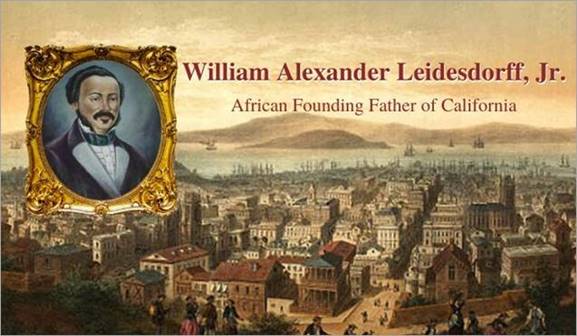From the Open-Publishing Calendar
From the Open-Publishing Newswire
Indybay Feature
Renovation and Preservation at Negro Bar California State Park

Date:
Friday, February 21, 2020
Time:
11:00 AM
-
12:30 PM
Event Type:
Press Conference
Organizer/Author:
Michael Harris
Email:
Phone:
916-346-3327
Location Details:
Negro Bar California State Park
Folsom Lake Recreational Area
Leidesdorff Adobe Home Site
Folsom, CA
Folsom Lake Recreational Area
Leidesdorff Adobe Home Site
Folsom, CA
California Governor Newsom and Bipartisan California Legislative Leaders will need to solidify a historic public/private partnership to research, document, preserve and interpret Pan African Heritage along the American River Parkway.
170 years ago the Gold Rush Mining Town was established on the land formerly owned by the "African Founding Father of California" who was instrumental in building the City of San Francisco.
Honorable William Alexander Leidesdorff, Jr. owned Rancho Rio De Los Americanos, over 35,500 acres along the American River Parkway.
Pan Africans in the California Gold Rush remain "Hidden Figures" of the California Mosaic.
Negro Bar, Folsom Lake State Recreation Area, continues to defy the normal course of business given past systemic institutional racism.
California State Parks will need direction to elevate the authentic legacy, building on long overdue construction of ADA accessibility.
Today, California State Parks current position.
Negro Bar, located within the Folsom Lake State Recreation Area, is historically important as the place where African American miners became the first to prospect the gravel bar in 1850.
It became one of the larger gold camps along the American River.
While African American community leaders and historians have supported the continued use of this name in the past,
California State Parks recognizes that such interpretations can change over time and welcomes continued feedback from the public.
In response to comments received in 2018, the department has undertaken a review to better understand the public’s perspective about the name and its continued relevance.
When new names are considered, California State Parks reviews the history of the area and tries to view names through the lens of thoughtfully capturing the place, its environment, and cultures and peoples associated with the area.
A primary interest in these reviews is holding broad and open discussions with scholars, visitors, activists, and families to understand perspectives and gain a wider understanding of the name’s usage and how it may impact the visitor experience and all citizens who come in contact with the name.
Soon, the authentic California Gold Rush History may be preserved for distant Californians and global Visitors.
170 years ago the Gold Rush Mining Town was established on the land formerly owned by the "African Founding Father of California" who was instrumental in building the City of San Francisco.
Honorable William Alexander Leidesdorff, Jr. owned Rancho Rio De Los Americanos, over 35,500 acres along the American River Parkway.
Pan Africans in the California Gold Rush remain "Hidden Figures" of the California Mosaic.
Negro Bar, Folsom Lake State Recreation Area, continues to defy the normal course of business given past systemic institutional racism.
California State Parks will need direction to elevate the authentic legacy, building on long overdue construction of ADA accessibility.
Today, California State Parks current position.
Negro Bar, located within the Folsom Lake State Recreation Area, is historically important as the place where African American miners became the first to prospect the gravel bar in 1850.
It became one of the larger gold camps along the American River.
While African American community leaders and historians have supported the continued use of this name in the past,
California State Parks recognizes that such interpretations can change over time and welcomes continued feedback from the public.
In response to comments received in 2018, the department has undertaken a review to better understand the public’s perspective about the name and its continued relevance.
When new names are considered, California State Parks reviews the history of the area and tries to view names through the lens of thoughtfully capturing the place, its environment, and cultures and peoples associated with the area.
A primary interest in these reviews is holding broad and open discussions with scholars, visitors, activists, and families to understand perspectives and gain a wider understanding of the name’s usage and how it may impact the visitor experience and all citizens who come in contact with the name.
Soon, the authentic California Gold Rush History may be preserved for distant Californians and global Visitors.
Added to the calendar on Tue, Feb 18, 2020 4:42AM
Add Your Comments
Latest Comments
Listed below are the latest comments about this post.
These comments are submitted anonymously by website visitors.
TITLE
AUTHOR
DATE
Negro Bar
Tue, Feb 18, 2020 4:39PM
We are 100% volunteer and depend on your participation to sustain our efforts!
Get Involved
If you'd like to help with maintaining or developing the website, contact us.
Publish
Publish your stories and upcoming events on Indybay.
Topics
More
Search Indybay's Archives
Advanced Search
►
▼
IMC Network


